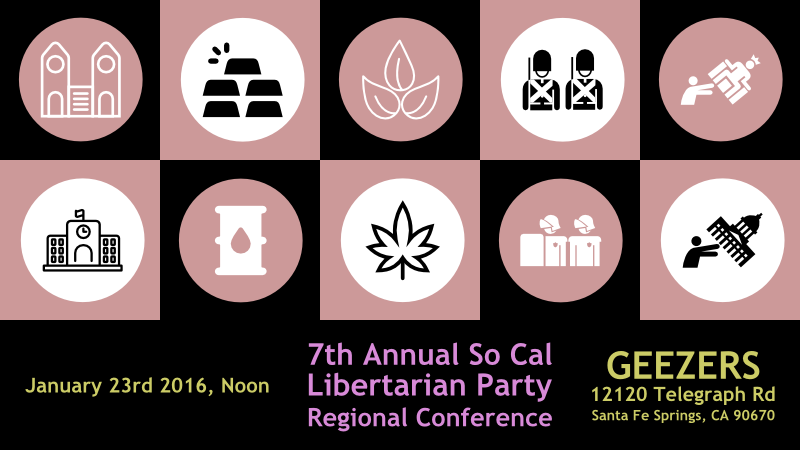At all times and in all things a Libertarian has to be able to say, “I did the right thing.” That is a strong burden, far more strict than any set of laws would ever be able to provide.
There is a high incidence of addiction among Libertarians. I am an addict. I am addicted to talking about social philosophy. So gripping is this addiction that I find myself in embarrassing situations. For instance the other day I had to break off a rousing conversation about hidden taxes in products we buy when I was reminded by the clerk at 7-Eleven that I needed to pay for my gasoline and pre-made sandwich. The guy in line behind me, my conversation partner, and a really good sport, helped me add up how much in taxes I just paid in front of the rest of the line. It was very entertaining for him, for me and for the young lady behind him who had been listening to us talk with a smile and occasional nods at some of our points.
Other people in line were not as amused but I was assured that they were at least OK with our little marketplace theater. The clerk, himself, was chuckling along with us though clearly he did not want to slow down our transaction and hold up the line. Neither did I. I paid, thanked my new found friend as I cleared the register space for him, and again thanked the rest with my eyes as I turned for the door.
Social Propriety is Important
Talking while you are at the register is a bit like striking up a conversation in an elevator. You have an unfairly captured audience and people do not like to feel imposed upon. As courtesy dictated I gave the line a smile recognizing to them my pushing the limits of propriety, saved by the fact that several were engaged and I was not simply bloviating. Previous to this I had made eye contact with others in line as the conversation began to develop and communicated to them that I knew I was pushing the limits, and got tacit permission to continue from each person with their patient, pandering and even encouraging facial responses. I mention this because social propriety is a very strong and important motivator for human action and a critical component of a holistic approach to ethics.
Understanding that there is more to ethics than what is written in the law is at the core of Libertarianism. It is why most people who believe in freedom feel that very little in our society is well resolved by creating laws. The most hard core of Libertarians would argue that no single legal system is necessary at all. This is where our social philosophy tends to look a bit muddled for people when they run into someone advocating zero or minimal government. It is too easy to go from that argument to interpreting that you mean there should be no rules. There are points that are famous “ouchie” arguments against Libertarianism: What if someone wants to have a nuclear bomb? Should they be allowed to have it? A conversation on this subject can devolve quite quickly if you are not sharp with your wits and recognize the trap of it. The answer is: of course not. No one should have nuclear weapons, including and especially governments.
Some Subjects are NOT Amusing
Another famous “gotcha” for Libertarians is the question of “age of consent.” This question is one that some overly erudite Libertarians have made some really horrible mistakes trying to address. The mistake is not in the philosophy, it is in the approach we take in explaining the philosophy. Libertarianism is not an “anything goes” lifestyle enabler as some try to make out. Frankly, a fully realized Libertarian on issues like weapons of mass destruction, age of consent and even annoying social behavior like talking in line is a bit more strict than what we could find in a model of legalism. To understand this we need to understand this idea of self-ownership.
The principles of Libertarianism say that we own ourselves. This is the self-evident maxim of the philosophy of freedom, but the principle also explicitly says everyone else owns their own selves as well and that we have a natural responsibility to recognize this sovereignty in others if we are to expect it to be recognized for ourselves. As Libertarians we recognize that we are fully responsible for how we affect others and that we must accept that responsibility. This accepting of responsibility is where I contend that Libertarians are more strict about things like proliferation of weapons of mass destruction and age of consent rules than legalism could possibly be. Libertarianism is not Libertine, it is the opposite.
Sometimes the Law is not Strict Enough
On the topic of the age of consent Libertarians are more strict than the law. Why? Because the law is only one component of our social boundaries. For a legalist, it would be perfectly OK for someone who is 57 to have a sexual relationship with an 18 year old if the law set the age of consent at 18. But to a Libertarian this question is more complex, and therefore more strict in implementation. To a Libertarian we are not just responsible for the age set in the law, we are responsible for interacting with this world responsibly, to not hurt others, and if we do cause someone damage to make recompense and suffer our loss of trust for the breach.
If a person is in an unbalanced relationship then there is going to be unfair dominance in the relationship almost certainly.
For a Libertarian consent is a more complex model than a line drawn somewhat arbitrarily in a person’s age. We are all and each of us bound to gauge more than just the law, we have to continuously calculate how we are affecting others. The question of, “is this person capable of consenting?” is not a function of a calendar. It is a function of the persons on both sides of the relationship. Because there is a component of dominance in many sexual relationships, the question has strong illustrators for this principle. Socially we all understand this. Our social interactions around sexuality have a lot of rules that are not in the law books. To a Libertarian each of these is important. To have an unfair sexual relationship very easily becomes a situation where one of the participants is not as willing in it as the other. The mechanics of this is not something I am qualified to elaborate on. I will leave that to the psychologists. On a real level all human beings understand this though and age of consent is an important emotionally poignant issue.
Legalism cannot have all of the answers, and when it tries to, it misses the mark. The laws around age of consent are not consistent from place to place or from one time compared to another. This is because social expectation is a big part of the formula for what is considered fair as a “default” rule. This social expectation component of things is poorly captured by law though. The social expectations around such things tend to vary in people. Not only is age important to consider, but what if the person is slower to mature than most others? In an extreme case (for illustration) an incapacitated person is incapable of even expressing consent (or lack of it). In the more general sense people are ready to understand the pitfalls, pain, joy and partnership of a sexual relationship at different ages. Who is to determine rightness for each individual?
Here is where Libertarians will sometimes blow it in trying to relate the philosophy. So many are concentrating on how unfair arbitrary hard line laws can be in this space. For this they choose to defend the wrong end of the argument too often. I want to illustrate the other end of this: The strictness of Libertarianism on actions that could be damaging.
Libertarianism Doesn’t Mean No Rules
As a Libertarian, one is obliged to be stronger in considering ones ethics than a person who takes a legalist view. Not only is there the line of the law but a number of other factors that one has to pay attention to. More than several. Personally, as I have considered this question I have compiled a list of some of the social norms that I personally recognize and I wanted to reflect on a couple of those in terms of how they, for a Libertarian, present a stronger and stricter model for age of consent.
If someone is not fully caring for themselves and you want to engage in a relationship with them, you must also get consent from the caretaker or you are aggressing.
I will start with social norms because, by far, this is strongest driving force in age of consent and not in a permissive way. In my culture there is the law but there are other rules. One such norm is a widely held rule of “Half plus seven.” For my friends that also subscribe this means that a reasonable measure of “OK” is each person in a relationship should be within half of the others age plus seven years. Not everyone around me subscribes to this model for understanding “fairness” in a relationship. I do. I think it is strong and non-exclusive model for measuring relative maturity levels. For me, to develop a relationship outside of this informal rule is a strong indicator of potential aggression as defined by principle.
The risk I and my friends identify in this rule is not law. We do not advocate violence if it is crossed. It is an indicator of something to be concerned about. I believe, and market forces would indicate, that this interface, between me and my peers is where real human interaction is the strongest for keeping an ethical society. We do look upon those who have broken their own rules with concern because we care about them, and a declining sense of propriety is a sign of depressed thinking. A head check is in order, and maybe a careful consideration of relationship.
People on an ethical decline tend to do a lot of damage as they forget their obligation to not harm others. It may be that the relationship is healthy, that a beautiful relationship has happened, perhaps because of a shared mind or soul – their paths aligned. But anyone who cares for the person would be well to check their head and the situation – for their protection and for the protection of those they care for, especially the people involved.
As a Libertarian I recognize that even if being slightly outside this rule is “legal” it may likely still not be “right”. If a person is in an unbalanced relationship then there is going to be unfair dominance in the relationship almost certainly. Beyond this there is an onus of fraud. At the beginning of such a relationship, at first contact this social more existed in the minds of both people. There was an expectation that the rule be followed even without supervision. The two people in the relationship as well as those around them that care and are safeguarding them as friends or family expect that both people, before they go to a deeper place, are NOT going to do so because it is out of bounds. To take the relationship to this unexpected place would be a breach of their implicit trust.
Libertarianism Better Protects the Vulnerable
The same would be true of someone who is not yet capable of fully supporting themselves. Regardless of age, if a person is not capable of engaging the world fully as an adult and is under the care and protection of another, then they are not prepared to make decisions like consent for a relationship or other contract. If a 25 year old person who suffers a cognitive disorder and does not have a job and is still living at home unable to support themselves, they should not be thought of as someone prepared to fully make consent decisions. Maybe with the assistance of the person who is responsible for them they could. As a Libertarian, in these situations you are aggressing if you do not have consent of not only the person you are seeking a relationship with, but also the consent of the person who has taken responsibility for them. The law tries to deal with this issue using cognitive tests and such when problems bubble up; but for the truly ethical person you can do nothing but recognize these situations and follow a stricter rule: Just don’t do it. If someone is not fully caring for themselves and you want to engage in a relationship with them, you must also get consent from the caretaker or you are aggressing.
These two illustrations are just the tip of the iceberg in these complex human questions. The point I would like to get across is that Libertarianism does not seek to short cut these areas of propriety, it in fact makes these social mores, expectations and existential questions more poignant to a Libertarian. It is not just about the law – that too is a social more that a Libertarian must obey – but so are all of the expectations of the community at large, the families and friends of the people involved and the people themselves.
Laws Can be Exploited, Libertarian Ethics Cannot
Libertarianism does not give people a free license to do what they like. Libertarianism sets up a framework of ethical action that is quite strict for those who adhere to it. Where a legalist would find the 18 year old rule in the law enough, Libertarians have to be conscious of far more. Libertarianism demands that people take full responsibility for the effects of their actions on others in all respects. It does not pre-define right and wrong in easy to read and (perversely) easy to exploit rules. We understand that hard line rules cannot capture all that is right and wrong. Libertarians understand that they must conduct themselves at an ethical level for all aspects of a situation. They do not have the cover from the excuse, “I didn’t break the law.” At all times and in all things a Libertarian has to be able to say, “I did the right thing.” That is a strong burden, far more strict than any set of laws would ever be able to provide.







